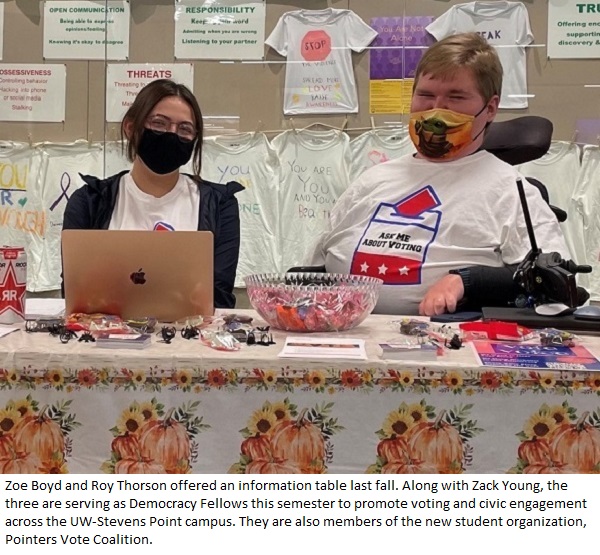Pointers Vote Coalition working to create a culture of student civic engagement
 As an election year begins, a new student organization at the University of Wisconsin-Stevens Point hopes to inspire an institutional culture of civic engagement and voting for students as part of their university experience.
As an election year begins, a new student organization at the University of Wisconsin-Stevens Point hopes to inspire an institutional culture of civic engagement and voting for students as part of their university experience.
Created last fall, the Pointers Vote Coalition is being supported through the work of three student interns serving as Democracy Fellows. Funding for the internships is provided through three non-partisan national organizations that support campus voter engagement: Campus Election Engagement Project, Campus Vote Project and the Andrew Goodman Foundation.
"The Pointers Vote Coalition stems from the idea that we all need to be involved in our community to make it better," said coalition president and Democracy Fellow Roy Thorson, a junior from Wausau majoring in business. "Our long-term goal is to make voting part of our culture at UW-Stevens Point for years to come."
The group's faculty adviser, Political Science Professor Jennifer Collins, said the group will maintain voting education year-round. The Student Government Association focuses voting education efforts around specific elections.
"This group is part of a greater, nationwide effort," she said. "Becoming civically engaged is an important component of a college education and becoming a citizen of this country and the world."
The coalition is planning educational events as well as movie and game nights that invite students to get involved and engaged in local, state and national elections, Thorson said.
Democracy Fellow Zack Young, a first-year communication student from Leopolis, hopes to plan a Bingo Night with facts about the Electoral College and how it works as well as Trivia Night about Wisconsin representatives and elections.
"Voting is a vital component of our democracy," Young said. "I saw the difference voting made over the course of the 2020 election. It is important for students to know the how and the where of voting."
Both Thorson and Young said keeping election information nonpartisan is important. "Our job is the provide the knowledge and information people need to make their own decisions," said Young.
All information provided to students is checked for any bias, Thorson said. The coalition plans to provide resources and information on what is needed to register to vote and casting votes. Information sessions or candidate debates will include representatives from all parties, he said.
The organization plans to build on voter engagement efforts that won UW-Stevens Point a Silver Seal award as part of the ALL IN Campus
Democracy Challenge, a national, nonpartisan initiative. More than 840 institutions with nearly 9 nine million students participated.
This is the first year that UW-Stevens Point has been recognized through ALL IN, Collins said. Last spring the university was also designated a "Voter Friendly Campus" by two national bipartisan organizations, the Fair Elections Center's Campus Vote Project and NASPA – Student Affairs Administrators in Higher Education.
"This recognizes the hard work done to promote voting and civic engagement on our campuses," Collins said. "This is an honor for our campus as well as a challenge to keep this important work going."
These designations recognize the 2020 election work done by the Student Government Association's Campus Elections Engagement Program Fellow Sanne Roeven and "Get Out the Vote" interns Maverick DeLain and Aaron Larson. Their efforts included creating a website with voting resources, nonpartisan handouts from the Campus Election Engagement Project, getting free voter I.D. cards for students, answering student questions through an online form and email and providing a shuttle bus to voting locations.
Doing all of this during the pandemic was challenging, said DeLain, a sophomore history education major from Germantown. "We had to hold safe events while still drawing students in so that heightened our need to think critically."
DeLain was part of an online student resource panel sponsored by the Milwaukee Bucks, "Vote 101: College Students Make Their Voice Heard," which also included students from UW-Madison and Marquette University.
"Being able to represent a smaller school and Central Wisconsin along with Madison and Milwaukee was really important to me," he said.
Data from the National Study of Learning, Voting and Engagement at Tufts University shows that UW-Stevens Point's midterm election voting rates increased from almost 33 percent in 2014 to 45 percent in 2018, and presidential voting rates grew from 55 percent in 2012 to 60 percent in 2020.
"Studies show that students want to vote, that they are interested and that it is relevant to their life," said Thorson. "We want to make it easier for them and give them the tools they need to get out and vote."
To join the Pointers Vote Coalition or join efforts for student civic engagement, email
rthor618@uwsp.edu.

